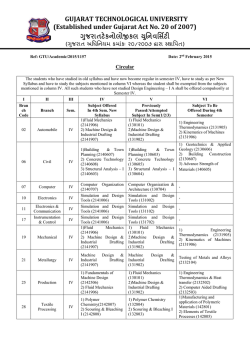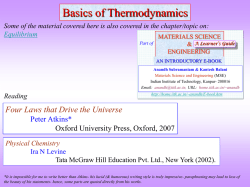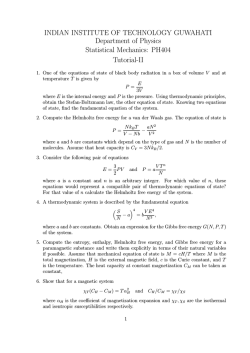
University of Puerto Rico Río Piedras Campus Faculty of Natural
University of Puerto Rico Río Piedras Campus Faculty of Natural Sciences, Department of Physics Undergraduate Programme Title: Thermodynamics and Statistical Mechanics Code: PHYS 4057 Number of Hours/Credits: 3/3 Prerequisites: PHYS 4031 (Mathematical Physics I) PHYS 4051 (Classical Mechanics I) Co-requisites: PHYS 4032 (Mathematical Physics II) Description The zeroth law of thermodynamics and the concept of temperature. The First law and the conservation of energy. The Second law and the direction of natural process. Carnot's engine. Concept of entropy. Absolute scale of temperature. The Third law and simple applications. The principle of statistical mechanics: Thermodynamic weight, Statistical mechanical ideas of entropy and the connection with thermodynamics; the Maxwell-Boltzmann, the Bose-Einstein, and the Fermi-Dirac distributions. Objectives After completing this course the students will know the basic principles and laws of thermodynamics and statistical thermodynamics and their mathematical formulation as well as methods of investigations of basic thermodynamic phenomena. They will have clear idea about the limits of applicability of physical model and theories used in this course. The students will know the role of thermodynamics and statistical mechanics in the scientific and technical progress and will be able to apply these to actual physical problems. The student will have mastered and practiced the application of simple mathematical techniques to solve basic problems. Course Content Week 1,2: Basic concepts -- Brief historical perspective – thermodynamics and statistical physics, Definitions of various thermodynamic terms, Concepts of work, energy, temperature and temperature scales. Zeroeth Law of thermodynamics, State functions. Week 3,4: First Law of thermodynamics. Equivalence of heat and mechanical energy ---- Joule’s experiment . First Law of thermodynamics as a statement of conservation of energy. Internal energy ---- a state function, đQ equations. Applications of the First Law. Joule’s free expansion, Specific heats of bodies, Internal energy of an ideal gas, Works done on an ideal gas in isothermal and adiabatic processes. Week 5,6,7: Enthalpy, Adiabatic processes. Second Law of thermodynamics and the direction of a natural process. Kelvin versus Clausius statements of the Second Law. Carnot engine and its efficiency. Carnot’s theorem and the absolute scale of temperature. Concept of absolute zero. Concept of entropy and Clausius’ theorem. Week 8,9: Properties of entropy, statistical mechanical ideas of entropy as a measure of disorder. Examples of Calculations of entropy – perfect gas, van der Wals gas. TdS equations. Week 10,11: Equilibrium of systems and thermodynamic potentials. Isolated systems, entropy never decreases. Constant volume processes and Helmholtz free energy. Constant pressure processes and Gibbs free energy. Maxwell’s laws. Week 12,13: Third Law of thermodynamics or the Nernst Heat theorem -- Unattinability of absolute zero. Experimental evidence of Third Law – Lange’s experiment. Some applications of the Third Law. Simple thermodynamic analysis of systems -- Van der Waal’s equation and law of corresponding states, Blackbody radiation. Week 14,15,16: Statistical Mechanics. Brief history of the development of statistical mechanics. Basic concepts ---- microstates & macrostates, phase space trajectory. Ensemble, ergodic theorem. Fundamental postulate – postulate of equal a prori probability. Thermodynamic weight W and total number of possible microstates. Counting W -- cases of indistinguishable and distinguishable particles. Bose-Einstein, Fermi-Dirac, and Maxwell-Boltzmann statistics. Connection with thermodynamics. Instructional Strategy The content of the course will be offered in the form of lectures with emphasis in examples of applications to different branches of Condensed Matter Physics. Minimum Facilities Required Traditional lecture room. Student Evaluation There will be four partial exams of equal weight distributed as follows: Exam 1: Week 5, will include the materials covered in Weeks 1-4, Exam 2: Week 10, will include the materials covered in Weeks 5-9, Exam 3: Week 14, will include the materials covered in Weeks 10-13, Exam 4: end-of-semester, will include the materials covered in Weeks 14-16. There will be practice homework assignments containing problems (similar to the exams) to be solved and later discussed in the classroomProblems in the exams will be based on examples done in class, suggested problems, and homework assignments. Grading System The student completing the course work will be graded according to the standard scale A to F. Text “Thermodynamics, Kinetic Theory, and Statistical Thermodynamics” III Edition ,1975, Authors F. W. Sears and G. L. Salinger, Addison- Wesley. ISBN 978 0201068948 Bibliography Some useful references.... 1. Jefferson W. Tester and Michael Modell, Thermodynamics and Its Applications 2. Dilip Kondepudi and Ilya Prigogine, Modern Thermodynamics: From Heat Engines to Dissipative Structures, Wiley 3. Charles E. Hecht, Statistical Thermodynamics and Kinetic Theory Rights of Students with Disabilities UPR complies with all federal and state laws and regulations regarding discrimination, including the Americans with Disabilities Act 1990 (ADA) and the Commonwealth of Puerto Rico Law 51. Students receiving services through Rehabilitación Vocacional must contact the professor at the beginning of the semester in order to plan for a reasonable accommodation and any required support equipment according to the recommendations given by the Oficina de Asuntos para las Personas con Impedimentos (OAPI) of the Dean of Students. Likewise, students with special needs that require some type of accommodation must contact the professor. Academic Integrity La Universidad de Puerto Rico promueve los más altos estándares de Integridad académica y científica. El Artículo 6.2 del Reglamento General de estudiantes de la UPR (Certificación Núm. 13, 2009-2010, de la Junta de Síndicos) establece que “la deshonestidad académica incluye, pero no se limita a: acciones fraudulentas, la obtención de notas o grados académicos vallándose de falsas o fraudulentas simulaciones, copiar total o parcialmente la labor académica de otra persona, plagiar total o parcialmente el trabajo de otra persona copiar total o parcialmente las respuestas de otra persona o las preguntas de un examen, haciendo o consiguiendo que otra tome en su nombre cualquier prueba o examen oral o escrito, así como la ayuda o facilitación para que otra persona incurre en la referida conducta” . Cualquiera de estas acciones estará sujeta a sanciones disciplinarias en conformidad con el procedimiento disciplinario establecido en el Reglamento general de Estudiantes de la UPR vigente. Information about Professor Name Lutful Bari Bhuiyan Office Hours Mondays, Wednesdays 8 am – 12 noon, 1.30 pm – 3.30 pm Fridays 8 am – 12 noon, 2 pm – 3.30 pm Telephone (787) 764 0000/extn 3579 e-mail [email protected]
© Copyright 2026


